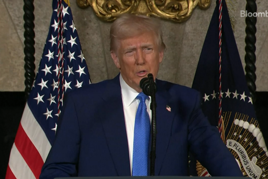US president Donald Trump has announced his administration is mulling a 25% tariff on imported cars, semiconductors and pharmaceutical products, with the new levies potentially taking effect as early as April 2.
 Click Here For Video This decision has sparked immediate concerns across the UK, particularly within the car manufacturing industry, a sector heavily reliant on exports to the United States.
Click Here For Video This decision has sparked immediate concerns across the UK, particularly within the car manufacturing industry, a sector heavily reliant on exports to the United States.
Although in terms of export car volume the US is far behind the European Union, which takes 54% of the cars UK factories export, it does account for 17% of our new car exports which makes it the second most significant market for UK car plants, ahead of China which takes 6.6%.
US president Donald Trump has announced his administration is mulling a 25% tariff on imported cars, semiconductors and pharmaceutical products, with the new levies potentially taking effect as early as April 2.
 Click Here For Video This decision has sparked immediate concerns across the UK, particularly within the car manufacturing industry, a sector heavily reliant on exports to the United States.
Click Here For Video This decision has sparked immediate concerns across the UK, particularly within the car manufacturing industry, a sector heavily reliant on exports to the United States.
Although in terms of export car volume the US is far behind the European Union, which takes 54% of the cars UK factories export, it does account for 17% of our new car exports which makes it the second most significant market for UK car plants, ahead of China which takes 6.6%.
The UK is one of the largest suppliers of luxury vehicles to the US with brands like Bentley, Rolls-Royce, Jaguar Land Rover and Aston Martin targeting wealthy American customers.
Last year, British car exports to the US amounted to around £8.3 billion, equating to about 100,000 vehicles.
Analysts warn that the new tariffs could significantly disrupt UK-based manufacturers, leading to reduced sales and job losses in key car manufacturing hubs, such as the West Midlands.
Oxford Economics, a prominent forecasting think tank, has projected that UK vehicle exports could drop by more than 7% as a result of the tariffs.
This would place the UK second only to Germany in terms of the hardest-hit European nations, with German car exports forecast to fall by 7.07%.
The UK Treasury has reportedly been conducting "extensive planning" in anticipation of Washington's trade measures. However, there is mounting concern over how the British economy, already navigating post-Brexit trade complexities, will adapt to this new challenge.
Given that the US is a key trading partner, these tariffs could force UK carmakers to either absorb higher costs or pass them on to consumers, potentially diminishing competitiveness.
Beyond cars, Trump has also confirmed that a 25% tariff will be applied to imported steel and aluminium from March 12, which could further strain UK manufacturing. Additional sectoral tariffs on pharmaceuticals and semiconductor chips are also expected to take effect in April, targeting industries where the UK has a significant presence in global supply chains. The US administration plans to review its trade policy on April 1.
The European Union, which currently imposes a 10% tariff on US car imports compared to the existing 2.5% US tariff on European vehicles, responded critically to Trump’s announcement.
EU trade commissioner Maroš Šefčovič is scheduled to meet with senior US officials to negotiate potential resolutions. The EU has however signalled its intent to defend its economic interests and could retaliate with countermeasures, further escalating trade tensions.
While Trump has suggested that companies relocating production to the US would be exempt from these levies.
Login to continue reading
Or register with AM-online to keep up to date with the latest UK automotive retail industry news and insight.
















Login to comment
Comments
No comments have been made yet.